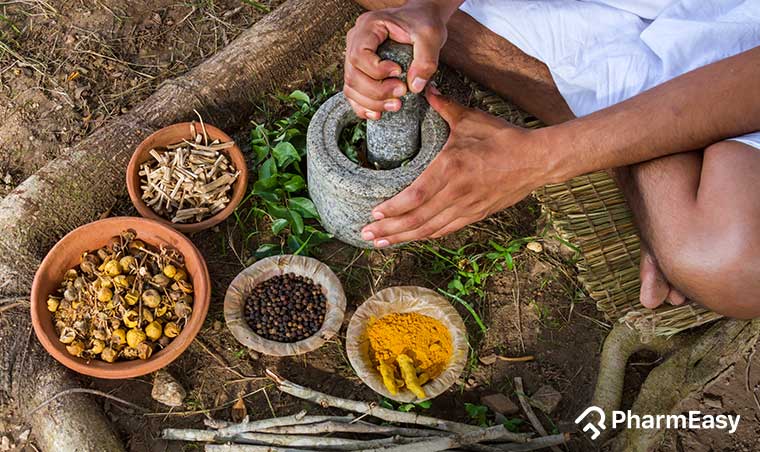How Effective Are Natural ”Nuskhas” For Managing Diabetes?
By Dr. Nikita Toshi +2 more

Get,

to manage your symptom
Get your,


4 Cr+ families
benefitted

OTP sent to 9988776655



You’ve successfully subscribed to receive
doctor-approved tips on
Whatsapp

Get ready to feel your best.

Hi There,
Download the PharmEasy App now!!


Register to Avail the Offer
Send OTPBy continuing, you agree with our Privacy Policy and Terms and Conditions

Hi There,
Sign up on PharmEasy now!!
Trusted by 4 crore+ families

OTP sent to 9988776655



You have unlocked 25% off on medicines




Code: NU25



By Dr. Nikita Toshi +2 more
Table of Contents
Diabetes mellitus, commonly called diabetes, is a lifestyle disorder that causes high blood sugar. In this metabolic disorder, either the body fails to synthesise or is unable to utilise the hormone insulin. The hormone insulin moves sugar from circulating blood into cells to store and make it available for utilisation as energy.
Ayurveda is an ancient Indian medical system. In ancient scripts of Ayurveda, diabetes is described as prameha. Prameha and madhumeha have a description as diseases affecting wealthy, affluent and elite populations. The scriptures have documented the use of Ayurveda in diabetes treatment in detail.

The vaidyas believed that the elite population only engaged in the pleasures of life and not physical activity. However, in modern times, we know that diabetes can affect people from all walks of life.
Even if lifestyle changes may help in many patients with type 1 or type 2 diabetes, these patients are more likely to develop various medical problems such as damage to their eyes and nerves, as well as heart attacks and strokes, medications play a very important role to prevent this from happening, do not stop your diabetic medications abruptly without consulting your physician.
Dr. Ashish Bajaj, M.B.B.S., M.D. in Clinical Pharmacology and Toxicology
In Ayurvedic manuscripts, the manifestation of madhumeha is through excess thirst and urination. Madhumeha Sanskrit word translated as ”Madhu” means sweet and ”Meha” means urine. The name madhumeha comes from the fact that diabetic urine tastes like honey.
In ancient Ayurveda literature, each person is a unique blend of Doshas. There are three Doshas: Vata, Pitta and Kapha. The Samhitas mention diabetes as primarily a Kapha dosha caused by excess body weight, overconsumption of sweets and lack of physical activity.
The treatment of diabetes in Ayurveda is classified based on the categories. Ayurveda has sorted diabetes into two categories and 24 subcategories. The two categories are:
The initial symptoms of diabetes include
Ayurveda in diabetes as a treatment modality offers a holistic approach. Ayurvedic treatment for diabetes varies based on the Prakriti (constitution) and severity of the disease. It includes
These herbal medicines enhance sensitivity for glucose receptors. They also enhance insulin secretion and support the regeneration of beta cells.
Herbs play an important role in diabetes management through Ayurveda. These are some of the commonly used Ayurvedic herbs for diabetes treatment.
It is advisable to consult a qualified Ayurveda doctor before administering these Ayurvedic home remedies for diabetes. A combination of these herbs in various quantities is found in the composition of Ayurvedic sugar tablets for managing diabetes.
The dietary recommendations for diabetic patients include:
Since the approach of Ayurveda in diabetes management is holistic, there are some Ayurvedic home remedies for diabetes that can be used. These are relatively safe and simple to use daily.
Ayurvedic home remedies for blood sugar include:
In conditions such as diabetes, patients may need a holistic mode of treatment to notice the required results. Patients can consider Ayurveda in diabetes treatment. It is a combination of choosing the correct diet, a gentle medium for treatment and regular exercise.
Disclaimer: The information provided here is for educational/awareness purposes only and is not intended to be a substitute for medical treatment by a healthcare professional and should not be relied upon to diagnose or treat any medical condition. The reader should consult a registered medical practitioner to determine the appropriateness of the information and before consuming any medication. PharmEasy does not provide any guarantee or warranty (express or implied) regarding the accuracy, adequacy, completeness, legality, reliability or usefulness of the information; and disclaims any liability arising thereof.
Links and product recommendations in the information provided here are advertisements of third-party products available on the website. PharmEasy does not make any representation on the accuracy or suitability of such products/services. Advertisements do not influence the editorial decisions or content. The information in this blog is subject to change without notice. The authors and administrators reserve the right to modify, add, or remove content without notification. It is your responsibility to review this disclaimer regularly for any changes.

Leave your comment...

View all comments(1)
Highly useful article I will follow